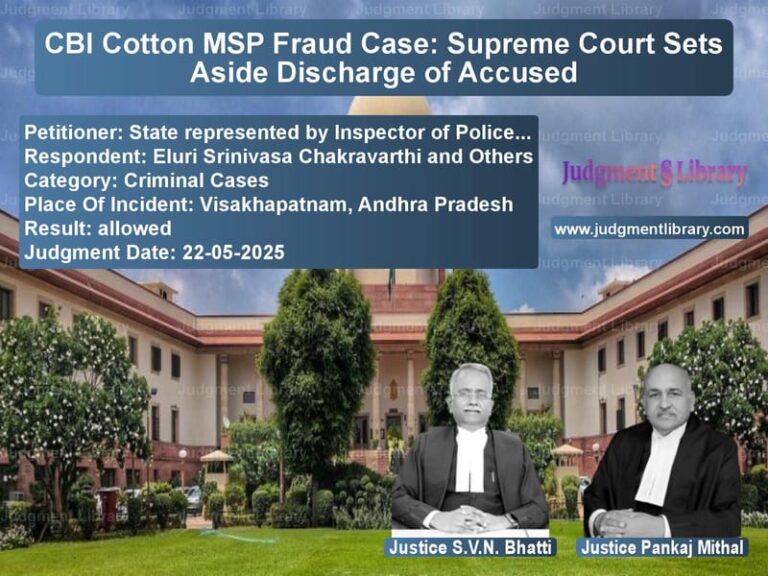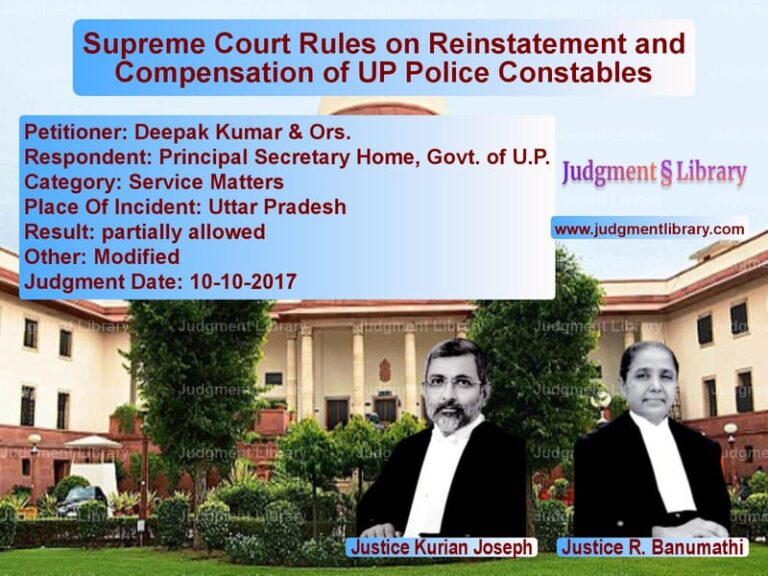Supreme Court Upholds Anti-Corruption Inquiry Against Public Servants: Key Takeaways
The Supreme Court of India, in a significant judgment, upheld the validity of an anti-corruption inquiry initiated against Charansingh, a former municipal council president in Maharashtra. The case revolved around the legality of a pre-FIR ‘open enquiry’ conducted by the Anti-Corruption Bureau (ACB) to investigate allegations of possessing assets disproportionate to known sources of income. The Court ruled that such preliminary inquiries are legally permissible and necessary to ascertain whether a cognizable offense has been committed under the Prevention of Corruption Act, 1988.
Background of the Case
The case originated from a complaint filed with the Director General, Anti-Corruption Bureau, Maharashtra, on February 7, 2018. The complaint alleged that Charansingh and his brothers had amassed assets disproportionate to their known sources of income while holding public office.
Read also: https://judgmentlibrary.com/joint-liability-in-criminal-law-supreme-court-clarifies-section-34-ipc/
Acting on the complaint, the Anti-Corruption Bureau, Nagpur, initiated a preliminary ‘discrete inquiry’ and subsequently an ‘open enquiry.’ On March 4, 2020, the ACB issued a notice to Charansingh, requiring him to appear before the investigating officer and furnish documents related to his properties, bank accounts, income tax returns, and other financial records.
Challenging the notice, Charansingh approached the Bombay High Court, arguing that the ACB had no authority to compel him to make a statement during an open inquiry. He contended that such an inquiry was unconstitutional and amounted to a ‘roving and fishing inquiry.’ The High Court dismissed his petition, prompting an appeal before the Supreme Court.
Arguments by the Petitioner (Charansingh)
- The Anti-Corruption Bureau had no legal authority to issue the notice since no FIR had been registered.
- The notice was issued under Section 160 of the Criminal Procedure Code (CrPC), which applies only to witnesses, whereas he was not a witness but a potential accused.
- Compelling him to provide details of his properties violated Article 20(3) (protection against self-incrimination) and Article 21 (right to life and liberty) of the Constitution.
- The inquiry was politically motivated and aimed at harassing him as a political opponent.
Arguments by the Respondents (State of Maharashtra and ACB)
- The ACB was conducting a legally permissible ‘open inquiry’ to ascertain whether a cognizable offense under Section 13(1)(e) of the Prevention of Corruption Act, 1988, had been committed.
- Such preliminary inquiries are essential to prevent frivolous and baseless FIRs against public servants.
- The Supreme Court’s judgment in Lalita Kumari v. Government of Uttar Pradesh (2014) explicitly allows pre-FIR inquiries in corruption cases.
- The petitioner was not compelled to provide information but was given an opportunity to clarify his financial position voluntarily.
Supreme Court’s Observations
The Supreme Court analyzed the legal provisions and upheld the validity of pre-FIR inquiries in corruption cases. The key observations included:
- Preliminary Inquiry is Permissible: The Court reaffirmed that in corruption cases, a preliminary inquiry is not only permissible but also desirable to ascertain the veracity of allegations before lodging an FIR.
- Scope of Section 160 CrPC: The Court clarified that while Section 160 applies to witnesses, the notice issued to Charansingh was not under this section but was a part of a broader inquiry process.
- No Violation of Article 20(3): The Court ruled that asking an individual to provide financial details for an inquiry does not amount to self-incrimination unless the information is used against them in a trial.
- Anti-Corruption Bureau Manual: The Court recognized that the ACB Manual explicitly allows ‘discrete’ and ‘open’ inquiries before registering a case.
- Political Vendetta Argument Rejected: The Court found no substantial evidence to support the claim that the inquiry was politically motivated.
The Court stated:
“An inquiry at the pre-FIR stage is held to be permissible and not only permissible but desirable, particularly in cases where allegations are of misconduct or corrupt practice involving disproportionate assets.”
Supreme Court’s Verdict
- The Supreme Court dismissed the appeal and upheld the High Court’s decision.
- The notice issued by the ACB was found to be legally valid.
- The petitioner was directed to cooperate with the inquiry.
- The Court clarified that any statement made during the inquiry would not be treated as a confessional statement.
Impact of the Judgment
- Strengthening Anti-Corruption Investigations: The ruling reinforces the power of anti-corruption agencies to conduct preliminary inquiries before registering an FIR.
- Prevention of Harassment of Public Servants: The judgment ensures that FIRs are not registered without sufficient preliminary verification.
- Clarification on Self-Incrimination: The Court clarified that providing financial details in an inquiry does not amount to self-incrimination.
- Legality of ACB Manual: The judgment upholds the legitimacy of the procedural guidelines in the ACB Manual.
Conclusion
The Supreme Court’s ruling in Charansingh vs. State of Maharashtra & Others sets a significant precedent for anti-corruption inquiries. It ensures that investigative agencies have the authority to conduct preliminary inquiries while protecting the rights of individuals under investigation. By affirming the legality of pre-FIR ‘open inquiries,’ the judgment strikes a balance between effective law enforcement and constitutional safeguards.
Read also: https://judgmentlibrary.com/supreme-court-modifies-sentencing-in-karnataka-kidnapping-case/
Petitioner Name: Charansingh.Respondent Name: State of Maharashtra and others.Judgment By: Justice M.R. Shah, Justice Dhananjaya Y Chandrachud.Place Of Incident: Nagpur, Maharashtra.Judgment Date: 24-03-2021.
Don’t miss out on the full details! Download the complete judgment in PDF format below and gain valuable insights instantly!
Download Judgment: charansingh-vs-state-of-maharashtra-supreme-court-of-india-judgment-dated-24-03-2021.pdf
Directly Download Judgment: Directly download this Judgment
See all petitions in Money Laundering Cases
See all petitions in Fraud and Forgery
See all petitions in Extortion and Blackmail
See all petitions in Judgment by Mukeshkumar Rasikbhai Shah
See all petitions in Judgment by Dhananjaya Y Chandrachud
See all petitions in dismissed
See all petitions in supreme court of India judgments March 2021
See all petitions in 2021 judgments
See all posts in Criminal Cases Category
See all allowed petitions in Criminal Cases Category
See all Dismissed petitions in Criminal Cases Category
See all partially allowed petitions in Criminal Cases Category







